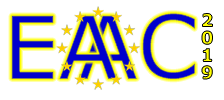Speaker
Description
Laser wakefield accelerators (LWFAs) using self- or ionisation-injection techniques have been demonstrated to produce GeV electron beams, but typically suffer from large energy spreads when operating in this regime. One promising alternative scheme is shock injection, where abrupt changes in the local density of a LWFA gas target can induce the injection of electrons into the wakefield. This technique has been shown to produce few-$\%$ energy spread, sub-GeV beams, at values of $a_0$ close to unity.
We present results on shock injection using the Gemini laser ($a_0 = 2.5$), producing $\Delta E_{\rm{FWHM}} / E \lt \sim 5 \%$ electron beams at $> 1$ GeV. Low energy spread electron bunches are a vital tool in precision radiation-reaction studies, where the distinction between competing semi-classical and fully-stochastic QED models is highly sensitive to initial bunch energy spread. Additionally these compact, low emittance electron beams could eventually provide sources for Thomson scattering, sources for free electron lasers or part of a staged acceleration scheme to reach multi-GeV electron energies.

